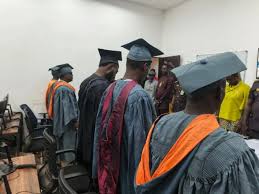
FG plans three national ID cards for 104m Nigerians June
In May of this year, the federal government plans to introduce three new national identity cards, with the aim of supplying them to around 104 million residents nationwide.
A social intervention card, an optional ECOWAS National Biometric Identity Card, and a bank-enabled National ID card are the three new national identity cards that the National Identity Management Commission has designed.
In an interview on Sunday, Ayodele Babalola, the Technical Adviser, Media, and Communications to the Director-General of NIMC, said that Nigerians would begin receiving the three national ID cards within a month or two of its launch.
He did, however, clarify that the launch date of May was contingent upon the President's consent.
"Within the next one or two months after launch, we expect the bank-enabled National ID to meet the needs of the middle and upper segments who typically use banks," said Babalola. In the next month or two, the National Safety Net Card will also be activated to fulfil the pressing demand for authentication and a safe platform for government services like palliative care. The 25 million Nigerians who are deemed vulnerable and supported by the ongoing government intervention projects would be the main emphasis.
All cards will be offered in virtual or digital form, albeit with less features, for those who prefer digital formats. In addition, ECOWAS cards will be provided in conjunction with the Nigerian Immigration Service if needed, he continued.
The Identity Commission announced plans to introduce a national identity card with many uses on Friday. It clarified that the identity solution included the capacity to make payments for all kinds of financial and social services.
In line with a statement released by NIMC on Friday, the Nigeria Inter-bank Settlement System, the Central Bank of Nigeria, and NIMC collaborated on this project. It seeks to provide additional options for domestic customers while encouraging more creative, economical, and competitive service delivery.
Babalola stated in the Sunday interview with The PUNCH that the new card will eliminate the need for physical identification by enabling cardholders to authenticate themselves, obtain access to public and private social services, and encourage financial inclusion for underprivileged Nigerians, empower citizens, and encourage greater participation in nation-building initiatives.
By the end of December 2023, he stated, the commission aimed to have distributed the cards to 104 million qualified applicants on the national identification number database.
"To resuscitate the general multipurpose card issuance, we will be undertaking the following programmes: first, we will work with NIBSS and banks to create a bank-enabled national ID card, and second, we will create a social intervention card under the National Safety Net Card. An optional ECOWAS National Biometric Identity Card will be introduced in the third phase.
"We are considering May for a potential launch, but that also need the president's assent. All that's left to do is tie up a few crucial details. AfriGo, a division of the national bank, will power the project, but everything stops at the table of the President.”
The CBN introduced AfriGo in January 2023 in an effort to promote data sovereignty and financial inclusion through the use of cards.
AfriGO was founded in Nigeria with a view to the continent; "GO" stands for advancement, empowerment, inclusivity, and looking forward to the future, among other things, while "AFRI" stands for culture, ethnic diversity, bravery, innovation, and growth.
This programme is being launched several months after Shubham Chaudhuri, the Country Director of the World Bank for Nigeria, declared that the two organisations would work together to guarantee the effective implementation and registration of digital national IDs for every Nigerian citizen.
148 million people of working age should have digital national IDs by the middle of 2024, according to Chaudhuri, who made this bold goal known at a meeting with Bosun Tijani, the minister of communication and digital economy. This would be a major step towards inclusiveness and accessibility.
"Working with NIMC to ensure the rollout of the registration so that all 213/220 million Nigerians have a digital national ID, starting, of course, with all people of working age, and I think the target for that is at least 148 million people by the middle of next year," stated Chaudhuri, "is one of the main partnerships we have."
Babalola went on to say, "On our part, we have done the necessary but we also have to wait for necessary permission," during the interview on Sunday. There will be three separate cards: one for social safety programmes and the seamless administration of palliative care. People will have the option to select from another one that is bank-enabled, depending on what they require. People with disabilities as well as those without bank accounts will be able to utilise it.
"The National E-ID card uses biometric authentication, such fingerprint and photo, to help with identification verification. It may be used as a debit and prepaid card for both banked and unbanked individuals. Because of its offline functionality, transactions can be completed in areas with limited network coverage. Banking details at the back of the card with chip and pin as well as magnetic stripe enabled.
"While the National Safety Net Card will be utilised for all government interventions and services throughout several ministries, departments, and agencies, it will also be enabled for identity. This card will be compatible with the current payment system and enabled for the eNaira, among other features and capabilities, in accordance with operational and security standards.
"The card will be issued based on the government programmes and current social register, and it will be used for all government social programmes, such as cash transfers, agricultural loans, student loans, health insurance schemes, micro contributions, micro pensions, etc. It will have a 10-year validity period. By using electronic money instead of cash, this will make actual access possible and help 133 million people escape poverty.
Babalola told our correspondent that the three ID cards would be launched when we asked him to elaborate. Indeed, he declared, "three cards will be launched."
Additionally, attempts to contact NIMC's Head of Corporate Communications, Kayode Adegoke, were unsuccessful since he did not answer calls to his phone number.
June is when cards are available.
In order to satisfy the demands of the middle and upper segments, Babalola stated that the commission would promptly activate the bank-enabled National ID within the next one to two months of its release.
Within the following one to two months of its launch, we anticipate that the bank-enabled National ID will fulfil the needs of the middle and higher segments, who are the ones who normally utilise banks. Additionally, the National Safety Net Card was activated to meet the urgent needs for authentication and a secure platform for government services such as palliatives within the next one or two months. The focus will be on the 25 million vulnerable Nigerians funded by the current government intervention programmes.
All cards will be offered in virtual or digital form, albeit with less features, for those who prefer digital formats. In addition, ECOWAS cards will be provided in conjunction with the Nigerian Immigration Service if needed, he continued.
The technical assistant explained the process in detail and stated that in order for citizens to obtain the new cards, they would need to submit requests at the bank and NIMC facilities.
"This online request self-service portal enables NIN holders to begin a card request and choose their chosen card type, bank, and pick-up location, regardless of their locations (local & worldwide).
"A NIN holder must go to the bank branch of his choice and use the NIMC verification service to get confirmed. Following a successful verification, bank employees fill out the applicant's information as specified above on the portal. The applicant then pays the required fees to complete the application process,” he said.
Experts respond
Oluseyi Akindeinde, the CEO of Hyperspace, responded by claiming that the planned endeavour was a waste of time and money and that the goal of the new cards was already being served by platforms that were already in place.
"I think it is a waste of resources and a duplication of effort because we already have the BVN and the NIN, and all of the things that were just mentioned can be used with the means that we currently have," he added. The government had intended to create cards that would serve as identification for citizens, similar to driver's licences.
To be honest, we could have utilised a digital card stored on a single phone or a number that has all of your information instead of a physical one. I don't think we now need three more cards because we already have driver's licences, foreign passports, permanent voter cards, and other similar documents.
"Those resources may be better used, and these cards are not what we need right now. Almost everyone already has a bank account and a debit card; I don't think we need to create additional ones for palliative care or identity, and I'm not sure what use they will have for the general public.
Chucks Jerahmeel, another IT specialist, voiced his misgivings on the large databa





